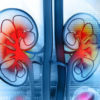Asthma Treatment in Northern New Jersey
 We all want to live our lives to the fullest. Whether we are training for a marathon or just want to be able to walk through the mall, few things are scarier than breathing trouble. That’s why people should always seek help from a medical professional if they suspect asthma may be affecting their daily lives. Bergen Medical Associates has an experienced team of allergy and immunology experts who can help provide the right asthma treatments for each patient. We offer many medical specialties for patients in northern New Jersey.
We all want to live our lives to the fullest. Whether we are training for a marathon or just want to be able to walk through the mall, few things are scarier than breathing trouble. That’s why people should always seek help from a medical professional if they suspect asthma may be affecting their daily lives. Bergen Medical Associates has an experienced team of allergy and immunology experts who can help provide the right asthma treatments for each patient. We offer many medical specialties for patients in northern New Jersey.
What Is Asthma?
Asthma is a disease that involves the lungs. Those suffering from asthma have inflamed or narrowed airways, making it more difficult for air to escape when they exhale. The condition is chronic, meaning it may worsen over time if not treated. According to the Centers for Disease Control and Prevention, this condition affects approximately 1 in 13 people in the United States.
Asthma, unlike some conditions, affects people of all ages and ethnicities. It also varies in severity, with mild conditions having little impact on the sufferer’s life, while major cases can become life-threatening.
What Are the Signs and Symptoms of Asthma?
The disease affects each person differently. Some experience symptoms only during specific activities like exercise, while others may experience them much more frequently. The most common asthma symptoms are:
- Chest pain or tightness
- Wheezing when exhaling (common in children)
- Shortness of breath
- Coughing, wheezing, or shortness of breath at night
- Coughing or wheezing attacks that are amplified with a cold or the flu
It may be a sign that asthma is worsening if a patient experiences these symptoms more frequently, if the need to use an inhaler increases, or if breathing becomes more difficult. Asthma attacks can be minor or life-threatening, so patients must pay attention to the signs. Rapid wheezing or shortness of breath, shortness of breath during periods of inactivity, and quick-relief inhalers being ineffective are all signs that one should seek emergency care.
What Causes Asthma?
Asthma can be caused by a variety of factors. For those who suffer from allergies, asthma may be triggered by the same cause as their allergies, but these triggers can vary from person to person. Pollen, dust mites, mold spores, pet dander, and other airborne allergens are common causes, as are colds and other respiratory infections.
Some asthma attacks are brought on by physical activity, smoke, or cold air, while others can be the result of over-the-counter painkillers, nonsteroidal anti-inflammatory drugs (NSAIDs), and beta blockers. Attacks can even be triggered by stress or the patient’s diet.
A patient may be at risk if they have a blood relative who has asthma or if they experience another allergic condition. Those who are overweight, smoke, or work in an environment that exposes them to chemicals or fumes are also at a greater risk.
How Is Asthma Diagnosed and Treated?
There is currently no cure for asthma, but medical professionals can easily treat its symptoms. Allergists and immunologists will start by performing a physical exam to see if other potential conditions can be ruled out. Several lung function tests can help monitor how much air moves during inhalation and exhalation. The patient may be asked to take part in additional testing, including allergy testing, chest X-rays, and nitric oxide tests.
Once asthma is diagnosed, the doctor will classify it as mild intermittent, mild persistent, moderate persistent, or severe persistent. This helps them create a treatment plan.
Long-term control medications will be prescribed if the doctor believes daily medications are necessary. These medications help with swelling in the airways and include inhaled and oral options. While inhaled medications have a lower risk of serious side effects, they can take longer to take effect.
Quick-relief medications, also called rescue medications, are designed for rapid relief of symptoms during an asthma attack. They can even be used before exercise to help prevent attacks. These medications also come in oral and inhaled forms. If medications have not proven fruitful, bronchial thermoplasty may be an option. This procedure involves heating the inner airways to help reduce their ability to tighten.
Seek Asthma Treatment from Bergen Medical Associates
Asthma affects millions of Americans, but it does not have to limit their ability to live a fulfilling life. Dr. Margaret Co, and the board-certified professionals at Bergen Medical Associates can help people in northern New Jersey suffering from any of these symptoms by providing the right asthma treatments. Patients can trust experienced and reputable physicians to take the right steps and help relieve them of their symptoms. Contact us today to learn more about this condition and the available treatments at our locations throughout northern New Jersey.










